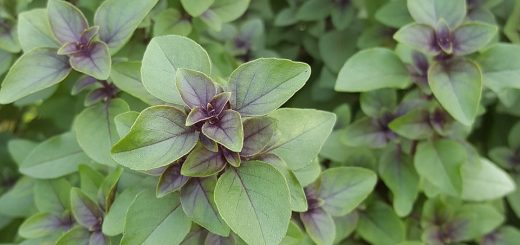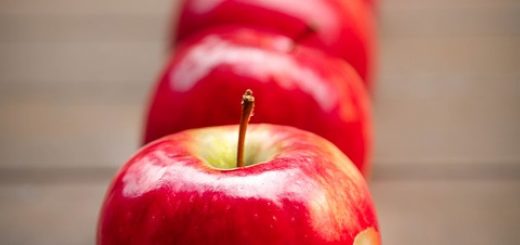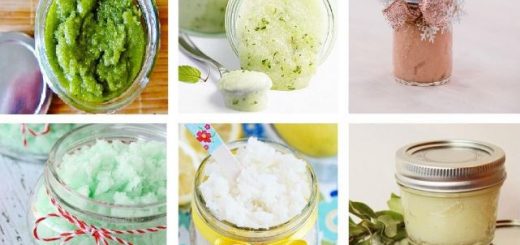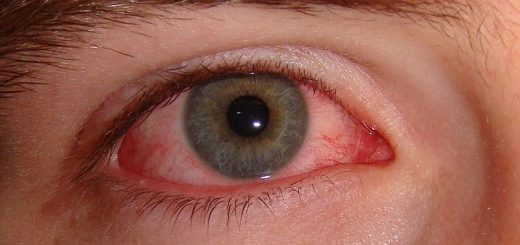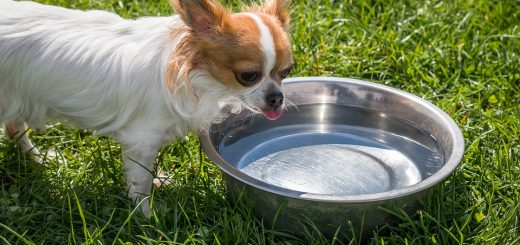43 Home Remedies for Food Allergies
When you experience a food allergy, it means your body is overreacting to a certain food. As such, the body’s immune system produces antibodies to battle the allergic reaction. Consequences of these food allergies are more often than not rather delayed and not as serious as they can be.
However, there are times when food allergies can have detrimental and life-threatening effects. You will see this in cases where the food allergy clogs your throat and prevents you from breathing. Below are some facts about food allergies.
- We have to note that in a lot of people, symptoms of food allergies show up rather late.
- Most food allergic reactions should be followed by consults with a doctor.
- Home remedies can be used alongside a proper doctor’s diagnosis.
- Statistics prove that a mere 6% of children and about four 4% are annually affected by food allergies of some sort.
- With food allergies, the body labels the food item as one that is unfamiliar and harmful to the body.
Symptoms of Food Allergies
Knowing which food items spur up an allergic reaction in your body is vital. This knowledge helps one to know when a reaction is occurring in your body. The symptoms of food allergies have to be detected and these symptoms may be mild symptoms or can even be more serious. The common symptoms include the following:
- Dermatitis
- A skin rash or hives
- Itchiness in and on the mouth, lips, tongue or gums
- Persistent and constant sneezing
- Runny nose
- Vomiting and nausea
- Tummy aches and gastrointestinal distress
- Head pains and lightheadedness
- Hoarse voice and wheezing
- Difficulty breathing
- Swelling of the throat
- Death
Common Food Allergies
Allergy-causing foods are mainly protein-infused foods but may also be food that we consume daily. Among the foods that have been noted as being the most familiar cause for allergies are:
- Eggs
- Dairy products
- Seafood
- Peanuts
- Tree nuts
- Shellfish
- Strawberries
- Various chemical additives
- Soy
- Wheat
- Synthetic and Natural Colorants added to foods
- Potatoes
Home Remedies and Preventative Measures for Mild Allergic Reactions
-
Avoid Certain Foods
Once you are aware that a particular food is the cause of an allergy, try to avoid that food forever. There is no need to test your body’s reaction to the food again. Once you suffer from an allergy, steer clear of those foods that caused the allergy.
-
Apple Cider Vinegar
Having the body’s PH systems out of tune can be problematic. Apple cider vinegar restores PH levels and betters your health. A daily dosage of diluted apple cider vinegar is a good remedy. To use apple cider vinegar, simply mix a equal parts apple cider vinegar with water and drink the mix.
-
Boost Low Stomach Acid
Your stomach could be deprived of or may lack appropriate levels of hydrochloric acid. Hydrochloric acid breaks down foods. That is why it’s important to have a good supply of hydrochloric acid in the tummy.
Take hydrochloric acid tablets during a meal or after the meal. This will help to secrete and produce as much acid as before adding additional acid. Take the tablets as directed on the packaging.
-
Hydrogen Peroxide
By using hydrogen peroxide, the bacteria in the body are eliminated. Hydrogen peroxide is a disinfectant and will fix your natural digestion system in a jiffy.
To use hydrogen peroxide to treat allergies, put hydrogen peroxide in a spray bottle. Spray this solution up your nose four times a day for four days.
-
Castor Oil
Castor oil is the tummy remedy and helps the tummy resist certain food items. By consuming castor oil, the detrimental effects of an allergic reaction are reduced. To learn how to consume castor oil safely, read this article.
Alternatively, a cup of caster sugar on a regular basis helps empty out the tummy.
-
Limes
Lime is a great detoxifying fruit. It has properties that are proven antioxidants and anti-inflammation catalysts. Having lime juice with water and syrups of honey is a great detox drink. The mixture drains the unwanted toxins from the body.

Adding limes to your drinks is one way to take in more of this healthy citrus fruit
-
Neti Pot and Saline Rinse
Strikingly enough, a saline solution or Neti pot works in counteracting the effects of food allergies. The saline spray drains allergies and sinuses.
A saline solution can be made by mixing sea salt and boiled water. Cooling down the water before inserting it into the Neti pot is important. Thereafter allow the neti pot to infuse your nostrils.
-
Acidophilus
Acidophilus is the bacteria that is in the digestive system; it assists in food digestion. This good bacteria restores the balance of the natural bacteria in the body. Adding yogurt and fermented foods work as well as acidophilus. This will relieve the body from the allergic reactions.
-
Quercetin
Quercetin is commonly found in fruits like citrus. It is advised that quercetin be taken as a supplement and this can reduce certain symptoms. This bioflavonoid controls cells and prevents the body from releasing histamine. Quercetin prevents inflammation and reduces allergic symptoms
Consulting a doctor before taking quercetin is important. Quercetin is not the best home solution for liver problem sufferers or for people who are pregnant.
-
Cool Water
One of the symptoms of food allergies is itchiness and thus using a cool water rinse on the skin reduces the feeling of itchiness. Pouring cool water on the skin reduces allergens causing the allergies. Do this a couple of times a day to promote calmness in your skin and put you at ease.
-
Strip the Clothes
Clothes often trap the food substances in their fibers and thus it is vital to remove any items of clothing at the time of a food allergic reaction. Make sure the clothes you wear are not repeated until they are thoroughly washed. Separate the clothes you have worn from others not used. This helps you control repeat infections and breakouts.
-
Ginger
Ginger is an antihistamine and has immune boosting properties. It is well-reviewed as an anti-inflammatory agent so that you will be better for it when you consume this spicy ingredient. It also reduces chest congestion and causes the stuck phlegm to flow out of the body. Ginger tea with a touch of honey and a spoon of lemon can ease allergic outbreak.
-
Coconut oil
Coconut oil reduces skin rashes and hives found on the surface of the skin. Also, adding lemon juice drops to the oil reduces skin rashes. Coconut oil is known to be good for your gut in particular and if there is too much unnecessary bacteria in the gut, the oil helps the gut’s probiotics to fight back.
The consumption of coconut oil minimizes the production of excess histamine which is harmful to the gut all work towards a perfect home remedy.
Furthermore, the application of coconut oil and splashes of lemon juice to itchy and affected areas is beneficial. To use coconut oil in this fashion, mix two parts coconut oil with one part lemon juice. Rub this mix on any affected skin areas (hives, rashes, etc.) and wrap the area with a clean piece of gauze. Keep the gauze on your skin until the skin condition has cleared up.
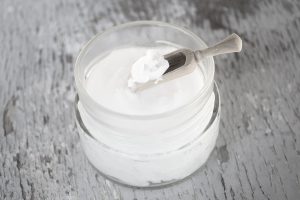
Coconut oil (solid)
-
Goldenseal
Goldenseal works as an immune system builder and has valuable antibacterial properties. It is rated among the best five picks of herbal products that are sold the most across the United States. It is effective for stopping inflammation , fevers and a range of nausea-related ailments. Goldenseal is ideal for battling of allergies and can be drunk in a tea form or swallowed as a capsule. If you take a capsule, take it as directed on the container.
-
Papaya Seeds
The seeds of a papaya are best for the skin. They are used in several pharmaceutical products to boost skin health, repairs and rejuvenation. The use of this remedy extends to the extracts from the papaya fruit known as papain.
To apply the papaya seeds to the harmed areas, its best to crush the seeds so that a paste can be made. The seeds have the magical properties of handling the allergy related symptom on the skin’s surface.
-
Peppermint Oil
Peppermint oil acts as a cure for inflamed throats commonly a side effect of food allergies. As an effective anti-inflammatory agent, it will put your body at ease and neutralize the effects of the allergic reaction. This oil works effectively on the digestive tract. Use this in the same way that you would use castor oil.
-
Turmeric
It is impossible to mention home remedies without mentioning the adding a dash of turmeric. Curcumin contained in turmeric powder unclogs any blockages. It is widely recommended as an anti-inflammatory as well as anti- oxidation prescription by herbal and natural healing practitioners.
Turmeric cures the effects of allergies and has beneficial powers to cure food allergy in particular. Turmeric has healing powers that are of the same status as some generic medications.
-
Baking Soda
A common effect of the food allergy is that skin irritations and itchiness occurs. There is also inflammation in the digestive tract and on other bodily areas.
A baking soda paste works to miraculously relieve itchiness and inflammation of any kind. A baking soda paste can be made by adding the soda to a bit of water. This paste can be safely applied to infected areas as often as needed in order to see results.
-
Poppy Seeds
Like other seeds, poppy seeds are seen as being a treatment for food allergies that take its toll on the skin surface. This remedy is rich in vitamins and is effective for a number of ailments. They can be found in grocery shops with ease.
A poppy seed paste can be made by adding mashed poppy seeds to just enough water. To this paste, squeeze in a few drops of lime juice. The paste works on all affected surface areas. Use this like you would use the coconut oil and lemon juice mix.
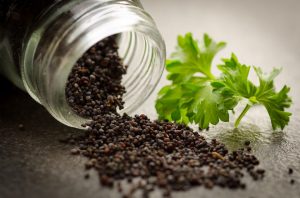
Poppy seeds can also be added to bakery items and consumed
-
Vitamin E-Rich Foods
The best way to defeat food allergies is by eating food that is high in vitamin E. Hence the vitamin has anti-allergenic properties and boosts your immune system. With a high concentration of the vitamin in the body it’s highly unlikely that good proteins would be labeled as unfamiliar substances. The food which contains a high concentration of vitamin E includes tofu, spinach, almonds etc.
-
Tartar
Tartar is the produced from the residue that is seen from the wine production process. Otherwise, it is linked to tartaric acid and has a rich base of nutrients. A paste made from tartar and water cures the rashes associated with allergies. Food allergies in particular can be remedied with the use of a good tartar paste. Use this like you would use a baking soda paste.
-
Grapes
A healing fruit for food related allergies is grapes. Grapes are abuzz with vitamins, potassium, and magnesium. They are rich in minerals and are excellent antioxidants. The grapes reduce coughing and wheezing. Grapes are also great with controlling any swelling in the body. Drinking grape juice or eating grapes or raisins are some simple ways to use this fruit for your benefit.
- Nettle Leaf
In order to stop producing histamine, nettle leaf can be used. The nettle leaf tea can be simply made and is a great way to get the antihistamine properties in your body.
The nettle leaf tea tastes best when other potent herbs are stirred into the teapot. Peppermint leaves are beneficial leaves that can be added to nettle leaf tea. Drink this tea whenever your allergy symptoms act up.
-
Water and Vinegar
An easy to make water and vinegar combination can be applied to the skin to destroy any hives and reduce itchiness. The combination works best when equal dosages of the water and vinegar is mixed together. Drink thrice daily for best effects. This is not likely to taste great, so drink it as quickly as possible.
-
Helpful Enzymes
Digestive enzymes ensure food is properly digested. If one lacks these digestive enzymes it is beneficial to take a digestive enzyme capsule or tablet. The tablet works to make the digestive process a smooth one and can be taken prior to meals or after eating. Digestive tablets that aid in the digestion of proteins, fats and carbohydrates work best. Take these tablets as directed on the bottle to get the best results.
-
Seafood
If seafood is not the food type that caused the allergy it can be beneficial to eat seafood at the time of the allergy. Non-saltwater fish in particular as well as algae are said to prevent swelling. The richness of omega 3 prevalent in seafood makes it all the more beneficial a food group.
-
Spicy Foods
It’s not a mystery that spice filled foods unblocks the nose. The intake of such strong food will release any mucus build up in the tract of the throat. Use a mix of chicken soup seasoned with parsley, cayenne pepper, red pepper flakes, or oregano or get some more spice into your diet.
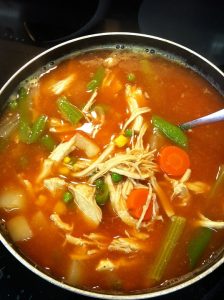
The spicier the soup, the better
-
Local Honey
Although honey is not a proven remedy for food allergy in particular, it is a harmless remedy to try. The history of people who tried it cannot be ignored and their positive stories must be proof of some benefits. The fact that having honey promotes your body to adjust to allergens in the environment is simply delightful.
The best honey is raw honey that is easily accessible. Honey can be eaten more than once a day to alleviate food allergy related symptoms. However, children under the age of two should not use this home remedy, as they cannot digest honey well.
-
Sandalwood
Sandalwood rectifies skin reactions. A solution can be made using lemon juice and some sandalwood. This solution will lead to less itchiness and no irritation on the skin. Simply apply this mix to the affected area to see results.
-
Fish Oil
Fish oil has potent properties and one such property is that it prevents swelling. The fish oil capsule should be taken at most thrice daily. To be safe, use fish oil supplements as directed on the bottle.
However, people whose food allergies were caused by fish or sea foods should not try this remedy.
-
Activated Charcoal
Activated charcoal will assist in breaking any protein particles in the tummy. This solution is purchasable from pharmacies and comes in a plain water or sweetened solution. The activated charcoal must be taken in larger quantities to work. Use this as directed on the container to get the best results.
-
Acupuncture
The acupuncture technique can be used to restore the dosha balance. This is Eastern medicine and alternative in nature but it’s efficacy is not in doubt. Regardless of whether acupuncture works to treat the food related allergy or not, it is a harmless remedy.
A therapist skilled in treating food related allergies will surely be of a great help. Do not try this at home unless you know how to do acupuncture already.
-
Vitamin C
An immune system deficiency is the cause of the food related allergic reaction. The way to build up the immune system is by taking vitamin C as well as other minerals. Vitamin C found in fruit is beneficial as long as the fruit of choice is not the one causing the allergic reaction. The same rule applies to any vegetables being eaten to strengthen the immune system.
-
Yoga
Yoga has the spiritual healing properties and thus is believed to minimize allergic reaction associated symptoms. The calming effect of this remedy is legendary and many people across European and American societies have taken to this Eastern practice. The best way to ensure the yoga is actually effectively healing is by seeking the help of a trained professional.
-
Carrot Juice and Cucumber Juice
The two C’s make a potential home remedy. The anti-allergenic properties found in both carrot juice and cucumber juice helps battle any rashes on the skin as well as other food allergy related symptoms. Simply drink these juices when your allergies act up in order to get relief.
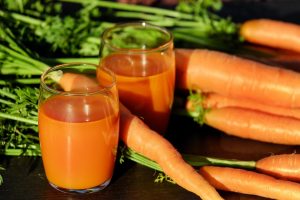
Carrot juice is delicious and healthy
-
Rotate Your Menu
Tweak your diet and ensure you are not eating the same food item for more than once in four consecutive days. The fact that you are not over exposing yourself to the same foods, makes the chances of getting food allergy symptoms far less.
-
Butterbur
Butterbur is an herb commonly used to heal allergies. It is ranked among the daisies and has been used as an herbal remedy for ages. The butterbur has been cited as a clearance herb for nose blockages.
The butterbur does not lead to drowsiness of any kind. Prolonged usage of the herb is not recommended as the effects of using butterbur often are yet to come to light.
-
Hot Pepper
The hot pepper is an excellent choice to rid the respiratory system of any unwanted bacteria. Hot peppers also work on clogged noses. Cayenne pepper in particular is said to be an exceptional cure in cleansing your sinus. Hot red pepper flakes are immune boosters and ensures a healthy heart.
-
Essential Oil Mix
The essential oils works best to remedy the allergic reaction symptoms on the affected areas or surface. The oils also work as a potent nasal remedy.
Dabbing a handkerchief with lavender, basil, peppermint, and essential oil drops and placing the soaked cloth against the nostrils is an idea. This idea will help unclog the nose and reduce allergy linked symptoms. Alternatively, the oils can be used in a diffuser.
-
Bananas
The use of banana goes beyond quenching hunger as it has active nutrients to benefit your health. Bananas remedy skin rashes and secondly, relieve any tummy discomfort. This remedy does not particularly work for rectifying food allergies but it can work on relieving the symptoms related to food allergies.
-
Garlic
Garlic surely does the trick to remedy food allergy. Laced with excellent antiseptic, anti-inflammatory, and anti-oxidizing agents, it is an aged-old remedy that you can trust. Cloves can be drunk in water or a garlic capsule can be purchased from a pharmacy. Of course, the easiest way to use garlic to is simply add it into your meals.
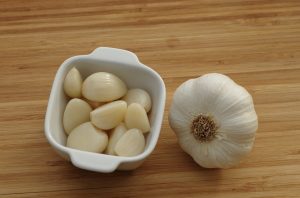
Garlic cloves and whole garlic
-
Elimination Practice
It is most important to know which foods is the cause of food allergies in your diet. This way you can eliminate those particular food items from your diet. If the allergy causing food source is unclear, an elimination diet option can be tried.
Recording the diet plan every week can help ensure that no mistakes are made in the elimination diet. Making a record of eating patterns allows you to slowly remove some foods from the diet whilst monitoring bodily reactions. If any food causes allergic symptoms to cease, continue eating this food.
-
Add Targeted Nutritional Support
When you are faced with allergic reactions, it is advisable to make choices that will boost your immune system. Multi nutrients, bioflavonoids, flaxseed oil, pantothenic acid, and vitamin C can boost your biological support systems so that you can get past the condition speedily.
Are you likely to try any of these home remedies? If so, comment below!
References
http://www.emedicinehealth.com/food_allergy/page7_em.htm
https://www.organicfacts.net/home-remedies/food-allergies.html
http://www.healthline.com/health/allergies/food-allergy-home-remedies
http://www.webmd.com/allergies/tc/food-allergies-home-treatment


